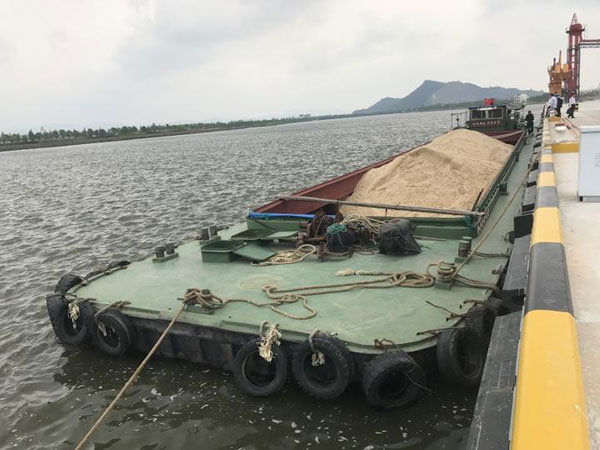Hangzhou-Ningbo Canal Ningbo section opens freight terminal

Yuechenghuo 0262, a ship carrying 420 metric tons of yellow sand, docks at the terminal in the Hangzhou-Ningbo Canal Ningbo section on May 6. [Photo/zj.zjol.com]
Ningbo Bilisheng Logistics Distribution Terminal, the first inland terminal of the Hangzhou-Ningbo Canal Ningbo section recently started operations with the first ship, carrying 420 metric tons of yellow sand, docking at the terminal on May 6.
It marks an end to the days when the Ningbo section of the canal had no freight terminals.
The terminal has four 500-ton-capacity berths and a complete set of supporting facilities such as hydraulic structures, storage yards and warehouses, stretching 260 meters along the shoreline and with a total capacity to handle 800,000 tons of cargo every year.
Ningbo imports most of the cement it needs from other places in or beyond Zhejiang province due to a shortage of limestone in the city.
"We used to sail along to Shaoxing before the terminal was opened, but now we can stop for a while at the terminal if we start late from Ningbo or in extreme weather," said Liu Xiucang, captain of the Yuechenghuo 0262, a cargo ship running from Ningbo to Shaoxing regularly.
According to Xu Mingjun, a local shipping administrator, Ningbo relies mainly on highway transport for cement delivery instead of water transport. However, research shows that inland water transport saves 20 to 30 yuan per ton of cement compared with highway transport.
Statistics from the Ningbo Shipping Administration shows that for every ton of cargo, the price of water transport is one quarter of that of highway transport, and the exhaust emission is one twenty-fifth, while the load and speed of water transport is not inferior to the highway.
Zhou Li, deputy director of the transportation department of the city's Haishu district, believes that the terminal will be an important freight channel for the Ningbo-Zhoushan Port, and play a positive role in easing urban traffic jams, promoting energy saving and emissions reduction, and enhancing road safety.
The Hangzhou-Ningbo Canal Ningbo section saw 18,649 ships carrying nearly 4.7 million tons of cargo passing by in 2018, up 41.83 percent and 45.66 percent, respectively.



 Print
Print Mail
Mail
